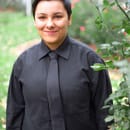On Monday, Oct. 22, the MCLA campus had a very special guest: Steven Dunn, the author of “Potted Meat” as well as other works, including his newest novel “Water and Power.” Dunn performed a reading of his books at Gallery 51, and also came into my Experiments in Creative Writing class to talk to us. He gave us words of wisdom, ranging from his writing advice to the truth and inspiration behind his work.
“Potted Meat” is a fictional novel about a young black man growing up with his family and dealing with the situations that arise in his life. Some of the themes and events in the novel were uncomfortable to read and talk about during class, yet Dunn believes that even though some subjects are taboo and hard to discuss, they need to be addressed. He says we need to “let these things speak.”
A writing technique that we find frequently in Dunn’s novel is the use of objects. He says that “Objects carry their own emotional weight based on how they are placed.” This, he goes on to explain, all comes back to balance. You need to balance your happy and sad images, in a way of simplicity. You can’t have too many sad objects because it takes away from the overall scene; you need to achieve balance or else one emotion will take over.
Something very unique to Steven Dunn’s writing is that he neglects to use quotation marks to signify dialogue. He has dialogue mixed in with everything else in the novel, yet the punctuation is removed. When we asked him why he would do this, his reply was simple. “I don’t see quotations when I’m talking to someone.” I had never thought about that. I just assumed that all novels had to follow the same grammatical structure, didn’t they? But Dunn has a very good point. You never see punctuation when you are talking to someone. Does removing it from a text make it more real and bring it closer to the reader?
The last piece of advice that Dunn gave to us can be helpful to everyone who likes to read and write. When you are in a workshop setting for a piece of writing, you need to look at the text in an objective manner. Dunn says you need look at what the story is actually doing, what is really important. “Don’t let anyone put something on you that isn’t important,” he says. This means don’t let someone in a workshop give you advice on your piece that has nothing to do with it. If you feel like something is important and essential to the plot, leave it in. Also, you need to remember that when you are the person giving advice to an author, it is not about your opinion. Dunn says it is not your writing, and “you don’t have to like it.” This piece is not about you and what you like, it is about helping your peer with their writing.
Steven Dunn had amazing advice to give us on his writing and the world of writing. Our class adored him—he was smart and cute and so hilarious! We loved the reading that he performed for us. I can’t wait to read his next novel and share his writing techniques!



